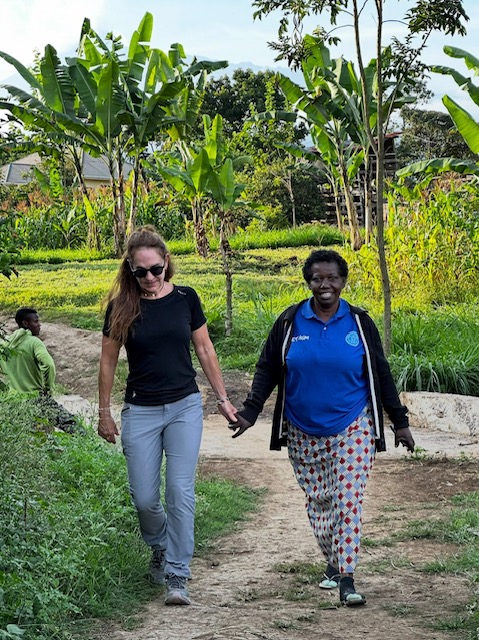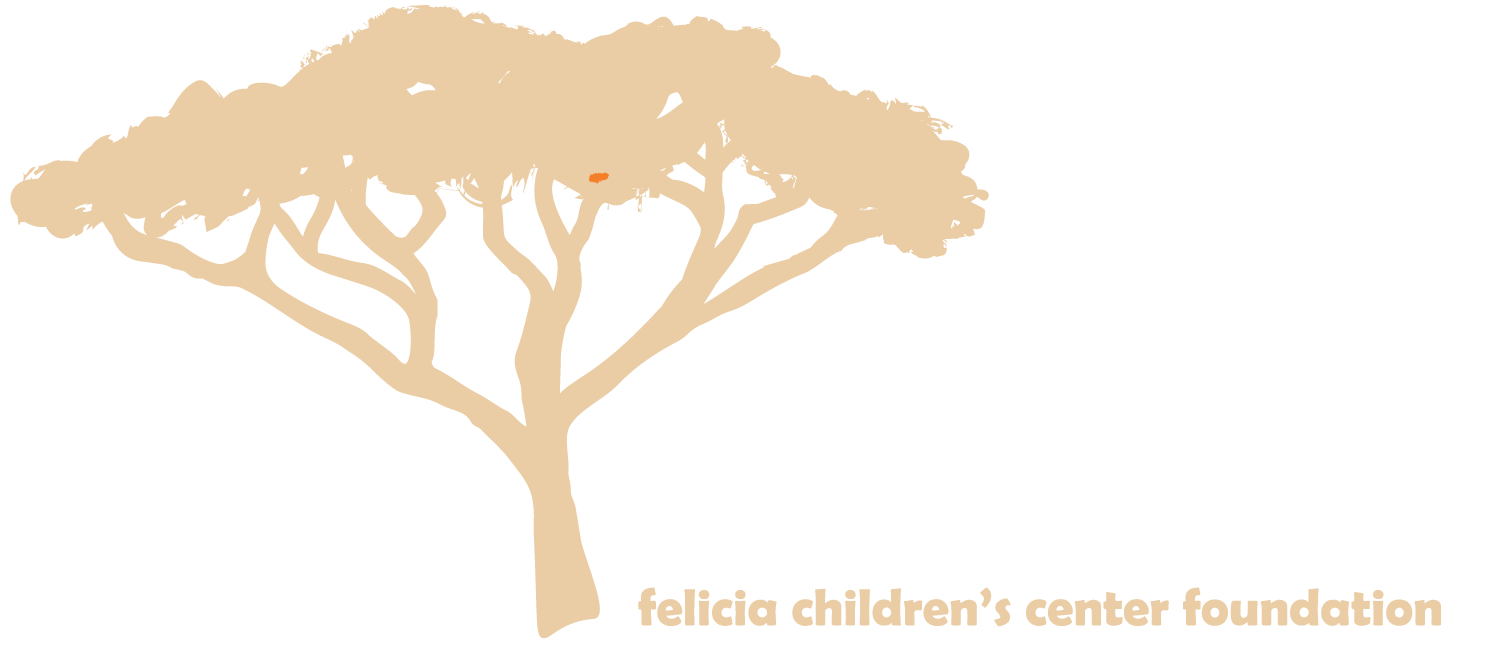
16 Sep Syracuse U. School of Ed, Photo Essay on FCCF
It’s been a whirlwind 18 months for Syracuse University School of Education Advisory Board member Felicia Walker ’87, P’17.
What started as a trip with friends to climb Mt. Kilimanjaro in Tanzania has become a commitment to build out and maintain a pre-school/kindergarten in a small village close to the city of Arusha, some 100 miles from the famous peak.
After an initial investment of $1,100 in January 2024, Walker has since recruited friends and family to donate time and money, held a fundraiser in her native New York City, and incorporated a 501(c)(3) non-profit organization: the Felicia Children’s Center Foundation (FCCF).
As of July 2025, more than $80,000 has been raised, a school building has been constructed, with a separate building for bathrooms, a drinking water filtration system purchased, a new playground installed, and the children offered an extensive Montessori curriculum, two healthy meals a day, and new uniforms. The school hosts 27 local children, many living below the poverty line, aged between 2 and 5 years old.
The Felicia Children’s Center is named after its benefactor, but Walker notes that her first name derives from the Latin for “happy.” This photo essay offers proof that “happy” is an appropriate name for the pre-school/kindergarten and documents the July 2025 trip to Tanzania by Walker, her husband Jeffrey D. Saferstein ’86, and daughter and SOE alumna Allie Saferstein ’17, G’19.

During her visit to Mt. Kilimanjaro in January 2024, Walker and her friends stayed at a lodge just outside of Arusha, a center for the region’s nature tourism. Showing the group around the area, a guide included a visit to what was then a tiny, ramshackle school on some private land, where children were “piled into a dirty little room.” “I became overwhelmed,” says Walker. She pledged then to help the school’s dedicated teacher, Ruth Laizer, and sole volunteer, Lotha Paulo Mollel.

Walker describes meeting Laizer as serendipitous. “Ruth was on the verge of giving up for lack of funds and community support,” she says. But Walker felt deeply connected to a woman who shares her grandmother’s first name and Lutheran religion (Walker is granddaughter of legendary Orange football coach Ben Schwartzwalder and Ruth “Reggie” Schwartzwalder). Walker promised to send Laizer and Mollel donations. Soon, she had friends and family contributing to the school’s future: “It started as a group text and evolved.”

In this photo, Felicia Children’s Center students stand between their schoolhouse and the new playground. Work to renovate the schoolhouse and bathrooms began in early 2024. Now the building has two mixed-aged classrooms, as well as new doors, windows, trim, curtains, and more. The Foundation has bought sitting carpets, while the students’ chairs and desks have been custom built. The playground was completed in May 2025.

The Felicia Children’s Center offers lessons in Swahili and English, taught by Montessori-trained Laizer and second teacher Jennifer Lihega Kasilo, who has experience in nursery and daycare. In the morning, the children gather in one room “so they can play with magnet tiles, Legos, zoo animals, and puzzles and read books, all of which were recently donated.” In the afternoon, there are academic lessons, on English, mathematics, health care, and social skills. “Ruth teaches a lot of manners,” observes Walker. “It’s really kind of refreshing. These kids are so well behaved.”

Providing proper nutrition is an important part of the school’s mission. Some of the first investments were in a water filtration system and in a garden to provide vegetables and fruit. In addition to healthy staples such as greens, beans, eggplant, bananas, potatoes, and watermelon, the Foundation provides cooking oil, some meat, peanut butter, maize, flour, rice, and spaghetti. Thus, in addition to their lessons, the children get two healthy meals and a daily snack. “The kids have gone from most of them being malnourished to really thriving,” says Walker.

In this photo, a dental hygienist shows a student how to brush her teeth. The children have had health checkups and screening for endemic diseases such as typhoid, malaria, HIV, and hepatitis (“The doctors were so amazing,” says Walker). The children were mostly healthy, aside from a couple of treatable illnesses, although the doctor noted that more snacks between main meals would boost their nutrition. The Foundation plans to offer an annual health check for the children, and it provides health insurance for the teachers and staff.

Jeffrey D. Saferstein ’86, a Whitman School of Management graduate, joined his wife on the most recent trip to Tanzania. Saferstein documents progress with his camera, and on this trip, he helped to build 10 freestanding bookcases along with a family friend, Seth Ragaini, who also came on the trip. A restructuring and bankruptcy attorney at New York-based Weil, Gotshal, and Manges, his law firm worked pro bono to help Walker incorporate FCCF and register it as a 501(c)(3) charity.

Walker’s and Saferstein’s daughter is Allie Saferstein ’17, G’19, who holds a bachelor’s degree in Selected Studies in Education and a master’s degree in Early Childhood Special Education. Allie works as a pre-kindergarten teacher in New York City. While in Tanzania, she helped decorate the classrooms and joined in with teaching. She is standing with Lotha Mollel, former volunteer and now operations manager, who helps coordinate construction, purchase food and supplies, organize doctor’s visits, and with accounting. “He’s remarkable,” says Walker. “Without him, I couldn’t have done all of this.”

Among the school’s many supporters, online influencer Natasha Fisher donated several “Pat the Spatulas” (a staple of her @traderjoeslist and @patthespatula Instagram pages). During Walker’s most recent visit, the children used them in a cooking lesson led by Allie Saferstein and Rose Benjamin Elias, the school’s cook and custodian. In case you were wondering, there is indeed a connection between Syracuse and the school’s orange uniforms, which were bought after a fundraiser in March 2025. “Orange has always been important to me for many reasons,” says Walker, adding that the teachers appreciate children wearing sweaters of a color different to the blue or green commonly seen in uniforms.

This photo shows students during their free play period. The Foundation has an Amazon wish list of school supplies and teaching materials for the kids, in addition to fundraising plans for a few bigger projects. These include completing a security perimeter wall (which will cost around $10,000) and a separate dining hall with kitchen and bathrooms ($40,000). Both of these are required by Tanzanian authorities in order for FCCF to qualify for non-governmental organization status.
In the future, Walker hopes to set up scholarships and after school enrichment programs for the children once they have aged out of kindergarten, pay more staff salaries, and cover operational expenses so the foundation can focus on student programs.

Sorry, the comment form is closed at this time.